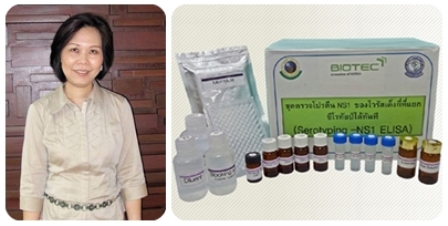Dengue is caused by four closely related viruses, dengue serotypes 1 – 4. Severe dengue hemorrhagic fever is associated with a secondary response to an infection by different dengue serotypes. Determination of dengue serotypes in current and previous epidemics is also crucial in being able to predict the severity of the current epidemics and for monitoring the predominant serotypes as a warning to a potential dengue outbreak.
Conventional methods of identifying DENV serotypes involve isolation of DENV in mosquitoes or cell cultures followed by immuno-staining with serotype-specific anti-DENV Mabs, or detection of viral RNA by sophisticated RT-PCR with serotype-specific oligoprimers. The former method takes 5-7 days; whereas the latter, though requires 1-2 days, involves complicated procedures.
The new assay “serotyping-NS1 ELISA” was developed to detect the NS1, a protein secreted from infected cells, and identify DENV serotypes simultaneously. The monoclonal antibodies (Mabs) against NS1 of each DENV serotype were produced and characterized for their serotype-specificity. To develop serotyping-NS1 ELISA, the selected serotype-specific anti-NS1 Mabs were applied to detect the NS1 antigen, which was previously captured by a flavivirus cross-reactive anti-NS1 Mab. This new method offers much simpler and faster diagnosis, providing results within 1 day.

Serotyping-NS1 ELISA was developed by Dr. Chunya Puttikhunt, in collaboration with scientists from Siriraj Medical School and Chiang Mai University. It was among the winners of 2013 NRCT Invention Award announced early this year.
